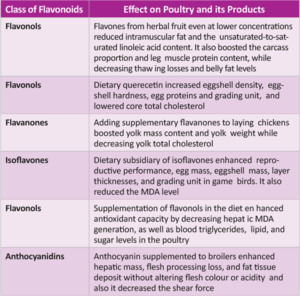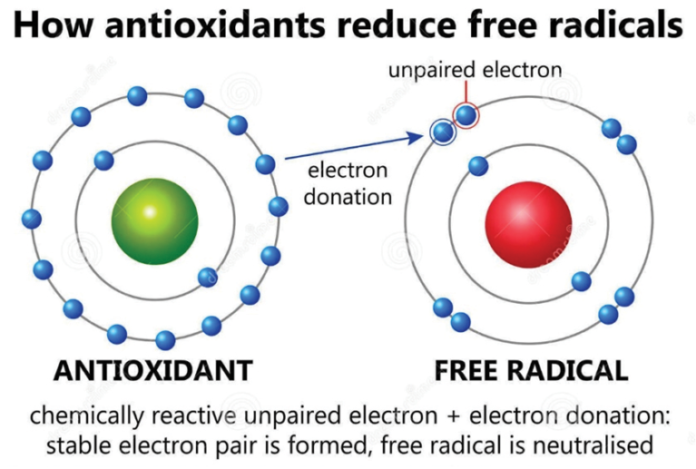Bioflavonoids : Natural Antioxidants for Growth and productivity improvement in Poultry
Food producing animals are highly prone to oxidative stress because of genetic selection for their growth rate and productivity and because of the environmental conditions in which they are reared. Oxidative stress has significant impacts on growth & performance and meat quality & safety. As such, antioxidants are often added to their diets to prevent oxidative stress and to ensure the quality and safety of the meat. Bioflavonoids are the biggest group of natural antioxidants having strong potential for application in livestock nutrition.
Dietary flavonoids and their effect on poultry and its products:

What are Bioflavonoids?
Bioflavonoids are natural-origin, bio-active polyphenolic secondary metabolites found in vascular plants, fruits and vegetables. They are found within plant cell membranes, and they consist of a group of naturally-occurring molecules responsible for the yellow hue seen in citrus fruits. They play a vital role in safeguarding the cells against oxidative damage.
How do flavonoids work?
Free radical-induced oxidative stress is a major factor in the development of several degenerative diseases in livestock. Oxidative stress can cause oxidative damage to large biomolecules such as lipids, proteins, and DNA, resulting in increased inflammation, impaired immunity and therefore poor health and production. To prevent or slow the oxidative stress induced by free radicals, sufficient amounts of antioxidants are required.
The chemistry of flavonoids is complicated. But simply put, flavonoids are most commonly seen as antioxidants. Antioxidants are important, because they protect the body against harmful and damaging free radicals. Free radicals are atoms or molecules in the body that have a single unpaired electron. Having an unpaired electron make these substances highly unstable and they roam throughout the body seeking to steal an electron from another atom or molecule. When an atom or molecule has an electron stolen from a free radical it then becomes a free radical as it now has an unstable number of electrons. This process continues creating a chemical chain reaction through the body. Most important when a free radical creates another free radical sometimes the loss of electron is so damaging that the cell can no longer function or becomes to function in an abnormal way. As such free radicals are seen as a major cause or enabler for numerous diseases or illnesses. Here’s where flavonoids come into play. As antioxidants they combine with and neutralize the free radicals in the body before they can kill the cells or damage their functions. Essential function played by flavonoids is that they help the body function more efficiently while protecting it against everyday toxins and stressors.
What is BioFlav?
BioFlav is a Citrus bioflavonoid complex (CBC) with Hesperidin, Isonaringin and Didymin as major constituents. Hesperidin, Isonaringin and Didymin are the most common bioflavonoids in the Genus Citrus. They occur mostly in the peel of some citrus such as Bitter orange, sweet orange, lemon etc., although they may also be present to a lesser extent in their pulps, juices, leaves, seeds and flowers.
Benefits:
Strong antioxidant: BioFlav is a strong chain-breaking antioxidant that provides potent cellular antioxidant defence against the damaging effects free radicals. Improves Immunity: BioFlav enhances mucosal and humoral immunity by increasing intestinal intraepithelial lymphocyte numbers, lymphoid organs (thymus, spleen and bursa) indices, as well as improving anti-avian influenza and anti-Newcastle disease antibody titres in poultry. Mitigates Heat Stress: As a natural antioxidant, BioFlav helps mitigate heat stress during summer by decreasing heterophil-to-lymphocyte ratios, and quenching reactive oxygen species generated by summer heat stress. Improves carcass quality: Supplementing BioFlav in poultry diets has shown the potential to progress the nutritional, sensorial and microbiological quality of poultry meat and eggs. In the last decade, several studies have determined the benefits of flavonoids for inhibition of lipid oxidation and microbial growth, check any pH-dependent deterioration and improve the colour stability of meat and related products. Flavonoids are typically absorbed in the ileum where pH is between 5-6.8. Furthermore, flavonoid supplementation in the chicken diet has been reported to positively alter the fatty acid profile of meat and eggs by reducing the cholesterol and triglyceride content. Meat colour, in terms of lightness, can be improved by up to 5%. Citations: Effect of Citrus Flavonoids Supplementation on Growth Performance and Serum Oxidant Levels of Broilers – Nicha Rodsatian, Ornprapun Songserm, Koonphol Pongmanee, Nuria Blanco-Pascual, Yuwares Ruangpanit Citrus flavonoids are important natural compounds with diverse biological activities. They can be used as an alternative to replace antibiotic growth promoters (AGPs) in poultry diets. This experiment was conducted to determine the effect of citrus flavonoids on growth performance and antioxidant status in broilers. A total of 1,440 one-day-old Ross 308 male broiler chicks were randomly allotted into 4 treatments with 12 replicates of 30 birds per replicate. The chicks were fed a control diet (CON), a control diet supplemented with 500 g of bacitracin/ton of feed (AGPs 500), 300 g of citrus flavonoids/ton of feed (CTF 300), or a mixture of 300 g of bacitracin/ton of feed and 200 g of citrus flavonoids/ton of feed (AGPs 300 + CTF 200), respectively. There were no significant differences in body weight gain, feed intake, feed conversion ratio, number of culling and mortality among dietary treatments during the starter, grower and finisher periods (P>0.05). However, for overall performance (1-37 DOA), birds fed diets supplemented with citrus flavonoids alone had lower FCR and mortality. In addition, the supplementation of citrus flavonoids alone reduced serum thiobarbituric acid reactive substances (TBARs) of broiler .Therefore, citrus flavonoids could be used as a substitute for antibiotic growth promoters in broiler diets.
Dr Sekhar Sushil Basak, Founder & Managing Director, Innovista Feeding Solutions Pvt Ltd India.


